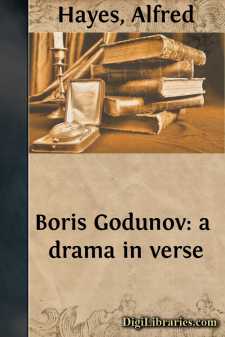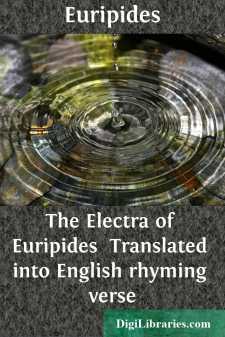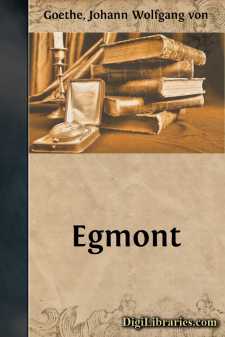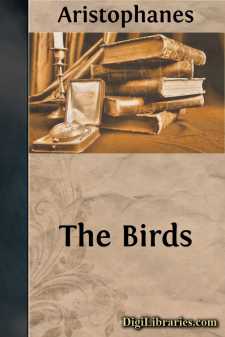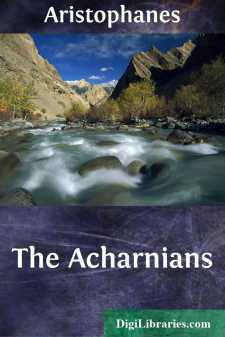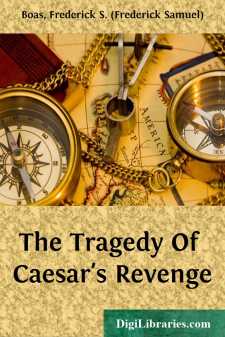Drama
- American 43
- Ancient, Classical & Medieval
- Asian 7
- Caribbean & Latin American 2
- Continental European 50
- English, Irish, Scottish, Welsh 91
- General 105
- Middle Eastern 1
- Religious & Liturgical 1
- Shakespeare 1
Ancient, Classical & Medieval Books
Sort by:
by:
Aristophanes
SCENE: A farmyard, two slaves busy beside a dungheap; afterwards, in Olympus. FIRST SERVANT Quick, quick, bring the dung-beetle his cake. SECOND SERVANT Coming, coming. FIRST SERVANT Give it to him, and may it kill him! SECOND SERVANT May he never eat a better. FIRST SERVANT Now give him this other one kneaded up with ass's dung. SECOND SERVANT There! I've done that too. FIRST SERVANT And...
more...
by:
Alfred Hayes
PALACE OF THE KREMLIN (FEBRUARY 20th, A.D. 1598) PRINCE SHUISKY and VOROTINSKY VOROTINSKY. To keep the city's peace, that is the taskEntrusted to us twain, but you forsoothHave little need to watch; Moscow is empty;The people to the Monastery have flockedAfter the patriarch. What thinkest thou?How will this trouble end? SHUISKY. How will it end?That is not hard to tell. A little moreThe multitude...
more...
by:
Alexander Dyce
THE TRAGICAL HISTORY OF DOCTOR FAUSTUS FROM THE QUARTO OF 1604. Enter CHORUS. CHORUS. Not marching now in fields of Thrasymene,Where Mars did mate the Carthaginians;Nor sporting in the dalliance of love,In courts of kings where state is overturn'd;Nor in the pomp of proud audacious deeds,Intends our Muse to vaunt her heavenly verse:Only this, gentlemen,—we must performThe form of Faustus'...
more...
by:
Euripides
Introduction[1] The Electra of Euripides has the distinction of being, perhaps, the best abused, and, one might add, not the best understood, of ancient tragedies. "A singular monument of poetical, or rather unpoetical perversity;" "the very worst of all his pieces;" are, for instance, the phrases applied to it by Schlegel. Considering that he judged it by the standards of conventional...
more...
ACT I SCENE I.—Soldiers and Citizens (with cross-bows) Jetter (steps forward, and bends his cross-bow). Soest, Buyck, Ruysum Soest. Come, shoot away, and have done with it! You won't beat me! Three black rings, you never made such a shot in all your life. And so I'm master for this year. Jetter. Master and king to boot; who envies you? You'll have to pay double reckoning; 'tis...
more...
Act I. A Representation at the Hotel de Bourgogne. The hall of the Hotel de Bourgogne, in 1640. A sort of tennis-court arranged and decorated for a theatrical performance. The hall is oblong and seen obliquely, so that one of its sides forms the back of the right foreground, and meeting the left background makes an angle with the stage, which is partly visible. On both sides of the stage are benches....
more...
by:
Aristophanes
INTRODUCTION 'The Birds' differs markedly from all the other Comedies of Aristophanes which have come down to us in subject and general conception. It is just an extravaganza pure and simple—a graceful, whimsical theme chosen expressly for the sake of the opportunities it afforded of bright, amusing dialogue, pleasing lyrical interludes, and charming displays of brilliant stage effects and...
more...
by:
Aristophanes
INTRODUCTION This is the first of the series of three Comedies—'The Acharnians,' 'Peace' and 'Lysistrata'—produced at intervals of years, the sixth, tenth and twenty-first of the Peloponnesian War, and impressing on the Athenian people the miseries and disasters due to it and to the scoundrels who by their selfish and reckless policy had provoked it, the consequent...
more...
Plays on the subject of Caius Julius are so numerous that some difficulty arises in properly distinguishing the titles. In the case of the piece here reprinted the first title, which is also the head title, suggests a play of Chapman’s, while the running title is the traditional property of William Shakespeare. It seems, therefore, best that it should become known by the name which appears second on...
more...
by:
Bernard Shaw
ACT I An October night on the Syrian border of Egypt towards the end of the XXXIII Dynasty, in the year 706 by Roman computation, afterwards reckoned by Christian computation as 48 B.C. A great radiance of silver fire, the dawn of a moonlit night, is rising in the east. The stars and the cloudless sky are our own contemporaries, nineteen and a half centuries younger than we know them; but you would not...
more...



